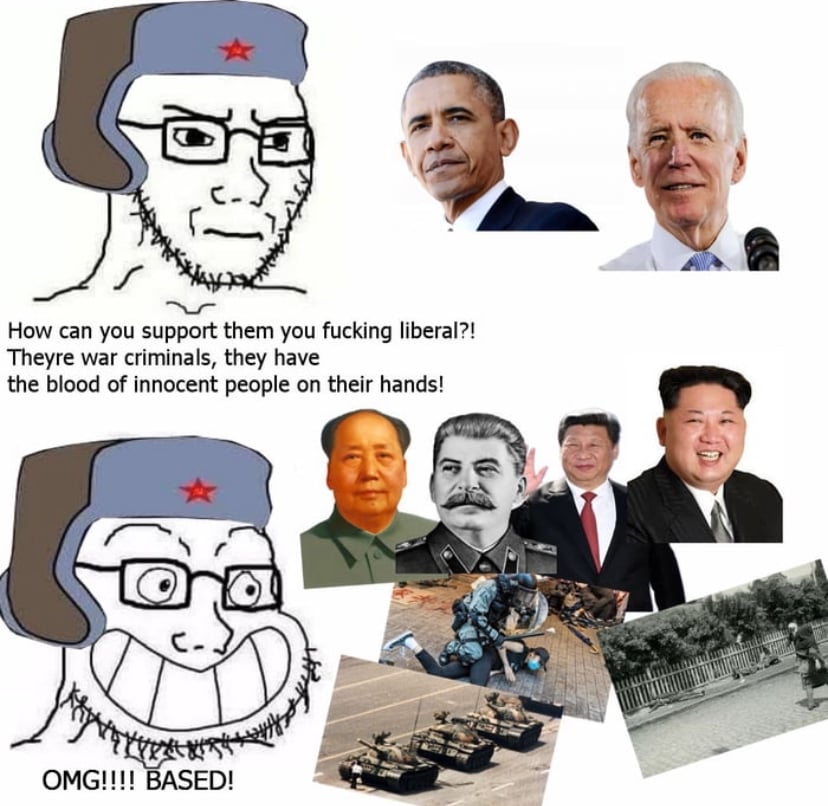this post was submitted on 22 Jul 2024
1231 points (100.0% liked)
Political Memes
8513 readers
2676 users here now
Welcome to politcal memes!
These are our rules:
Be civil
Jokes are okay, but don’t intentionally harass or disturb any member of our community. Sexism, racism and bigotry are not allowed. Good faith argumentation only. No posts discouraging people to vote or shaming people for voting.
No misinformation
Don’t post any intentional misinformation. When asked by mods, provide sources for any claims you make.
Posts should be memes
Random pictures do not qualify as memes. Relevance to politics is required.
No bots, spam or self-promotion
Follow instance rules, ask for your bot to be allowed on this community.
No AI generated content.
Content posted must not be created by AI with the intent to mimic the style of existing images
founded 2 years ago
MODERATORS
you are viewing a single comment's thread
view the rest of the comments
view the rest of the comments

I have a hard time imagining you didn't understand the question but I do understand why you wouldn't care to answer it. Just in case there is a language barrier or some other reason why you didn't understand a basic English sentence, I'll try putting it in simpler words:
Is it antisemitic to disagree with the Israeli government or their position on historical events?
The analogy here is that animus against a government says nothing at all about animus towards a people. Even if you are correct about the West having animus towards the government of China, that doesn't equate to animus towards Chinese people. You can certainly argue that their is racist animus, but the example of that couldn't be disagreement with the government's position in the same way that disagreement with the Israeli government's position is not evidence of antisemitism even though antisemitism is a real thing that exists.
I'd be curious to read any sources you have for this claim. Why would the government ban information about the event in addition to arrests and intimidation towards people who want to memorialize the anniversary of the event? Would it be ok for the US to ban information about J6 and arrest people who wanted to organize a protest in remembrance? (Setting aside the morality of the changes sought by the J6 protesters vs TS protesters, they both have a basic human right to protest and hold memorial events)
So, again the claim you are responding to is about the Chinese government's position on TS. As you just said a moment ago, the claim is that you can't talk about TS because the government doesn't allow it. Why does the government want its citizens to not know about TS? As you say, their own history?
As an analogy, racists in America say that black people are inherently more violent than white people. Is it racist to acknowledge the objective fact that black people are arrested for violent crimes in disproportionate numbers? Does that statement say anything at all about the inherent nature of black people? Can we not even talk about poverty being the root cause of crime and the systemic racism in the criminal justice system without it being racist?
In the same way, if the government of China is trying to hide information about their history, is calling out that government action racist? If so, then you have just given a blank-check to the CCP.
Maybe you kind of missed the whole point of what the West says happened at TS, but the student protesters were doing exactly that when the PLA got sent in. That's kind of the whole point. The protesters were there to defend themselves and their fellow citizens against an unjust government when they were violently quelled by that very government.
Maybe you don't know much about how authoritarian governments operate. If the punishments exist and are sufficiently terrifying you can keep most citizens from believing the things you don't want them to, or at least from speaking those thoughts in public. And again, the whole point of the anniversary protests in HK that China went in to shut down was that they were there to reject not being able to discuss those things when China took control of the government. Is it just a coincidence that those protests don't happen anymore or could it be that the fear created by the government's actions against protesters have succeeded in their goal for the most part?
Again, this entire conversation is about the actions of a government. Whether or not they overlap with racist tropes isn't relevant to the truth of the claims. Acknowledging that the treatment of Palestinians is unjust and genocidal is not antisemitic even though there is a stereotype that Jews lie. Acknowledging that the treatment of TS protesters was unjust and murderous is not sinophobic even though there is a stereotype that Chinese people don't fight for their freedoms.
Repeating the same statement doesn't make it true.
Is the original claim that people can't talk about TS because the government won't let them or that people can't talk about for some other reason?
The statement "people cant talk about TS" is a statement about the government's actions to discourage discussion about it.
You keep repeating the same thing while ignoring that the claim is about government action.